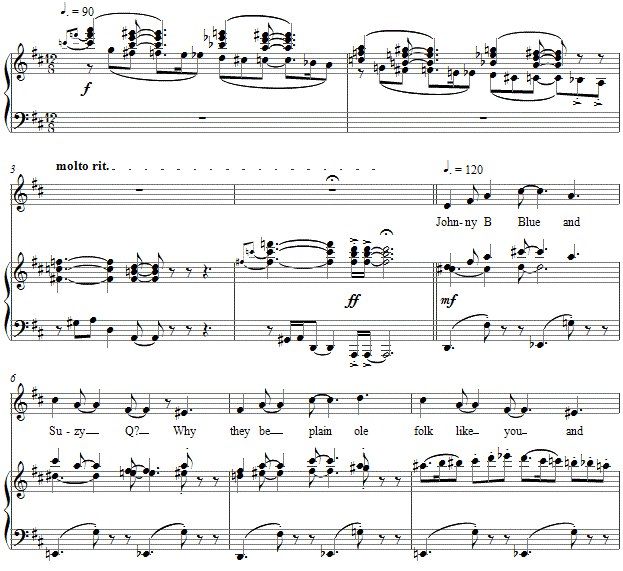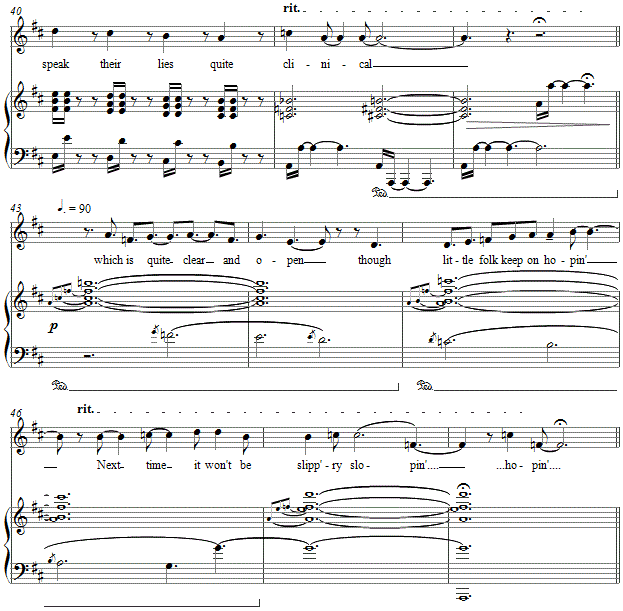Music and Texts of GARY BACHLUND
Vocal Music | Piano | Organ | Chamber Music | Orchestral | Articles and Commentary | Poems and Stories | Miscellany | FAQs
Johnny B Blue and Suzy Q - (2013)
text of the composer
for medium voice and piano
Johnny B Blue and Suzy Q?
Why they be plain ole folk like you
And me and all them others who
Live their lives and love them too.
Plantation hands and peasants all;
Laboring folks some boss would maul,
Get chewed up, spit out, we'd best recall,
Cause grandees always make them small.
Massas, pols, the upper crust
Grind these little folks to dust
For use in mobs and armies' thrust
To feed their bosses' bossy lust.
High atop some pinnacle,
The politick-hatchet cynical;
They speak their lies quite clinical
Which is quite clear and open
Though little folk keep on hopin'
Next time it won't be slipp'ry slopin'....
Johnny B Blue and Suzy Q?
They still be plain ole folk like you
And me and them others too;
From them those massas took, who
Plan to steal yet more from you
For that is what's in store, it's true,
For Johnny B Blue and Suzy Q
And me and you -- and you and you.6 pages, circa 2' 40"
All too many photographic images of lines of out-of-work people from one continent to another can be found in recorded archives today. In the last century, fault has been assigned all too often to capitalism, though most of these images are rooted in socialist and heavily-indebted social welfare economies, many of which are now at their economic wits' ends over the questions of austerity against massive public debt. One saw this as many fled across the wall to West Berlin. (See: my poem, Fled from empty market shelves)
One sees this with angry demonstrations in Athens today, its socialist government having fallen, as one sees it in the increasing indebtedness alongside insolvency of Detroit. One sees this in war-torn Muslim lands in the moment where food lines are lifelines, as one sees this poverty for most people in Zimbabwe under the Marxist-inspired Zanu-PDF, as but one example among all too many. The question of how one achieves prosperity for the many remains unanswered, as social, political economic theories of varying kinds have repeatedly failed to show the way out, all the while promising to do so. Among my favorites is the so-called "revolution" in Cuba, now sclerotic and creaking under under the many decades-long, single-party led economic incompetence of the octogenarian Castro brothers. (See: the comments and associated references which follow my doggerel: Socialism's Last Hurrah.)
Now famously known is Luxembourg Prime Minister Jean-Claude Junker's glaring observation of the political class, "We all know what to do, we just don't know how to get re-elected after we have done it." What remains clear is that through rising prices and rising demands from governments for increased taxation, the little guy is always in the bull's eye. This was true historically, and it is true today. From the institutions of serfdom and slavery to the modern debt slave, now captured in the relatively new phrase, "hereditary collateral-debt bondage," one sees the many under pressure from the upper crust. (This phrase is documented, alongside my observation in rhyme, It's lovely to learn a new sterling phrase.)
The opening cascade of chromaticism introduces this 12/8 musical jaunt. Light dissonances in the accompaniment pit notes against one another, a musical metaphor for the media messages of today. The musical strophe is constructed of two four line quatrains of the poem. The syncopated rhythmic motion forward should be stressed.
A middle section in this longer ABA form halts the allegro and a break from the 12/8 is notated for the vocal line. After this brief visit to "hope," the up tempo takes up again, driving home the clear message of this setting of social conscience arrayed against the "massas."
The score for Johnny B Blue and Suzy Q is available as a free PDF download, though any major commercial performance or recording of the work is prohibited without prior arrangement with the composer. Click on the graphic below for this piano-vocal score.


